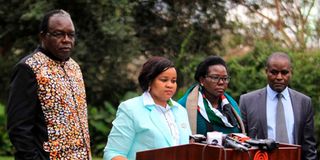Three Meru residents out to save ‘Cherera 4’

Former IEBC vice chairperson Juliana Cherera (second left) with commissioners (from left) Justus Nyang’aya (resigned), Irene Masit and Wanderi Kamau.
Three Meru residents have moved to court seeking to stop a tribunal appointed to investigate the conduct of four IEBC commissioners during August polls from kicking off its hearings.
They want the court to issue conservatory orders restraining the implementation of the special gazette no. 14890 of December 2, 2022, which announced the appointment of the tribunal by President William Ruto.
The tribunal led by Appellate Judge Aggrey Muchelule is mandated to consider the petition for the removal of Juliana Cherera, Francis Wanderi, Irene Masit and Justus Nyang'aya as IEBC commissioners.
The petitioners also want the court to issue a conservatory order restraining the implementation of the report of the National Assembly on the petitions for removal from office of the four commissioners.
Meru High Court judge Edward Muriithi certified the petition filed by Mr Philemon Munjuri, Godfrey Kinoti and Joshua Mwirigi as urgent and fixed it for directions on Wednesday.
The judge also ordered the petitioners to serve the National Assembly, the tribunal and the Attorney General whom they have named as first, second and third respondents respectively.
The besieged commissioners have also been enjoined in the matter as interested parties.
The petitioners say the ongoing process against the four commissioners was an unconstitutional “whimsical and pre-determined charade” and urged the court to stop it in the interests of the rule of law.
Decisional independence
Through lawyer Mugambi Kiogora, they insist that the commissioners serve as independent State Officers and enjoy the benefit of “decisional independence” in their performance.
They hold that the IEBC commissioners enjoyed protection from penalty or liability for decisions taken in good faith while in office and were being unjustly persecuted.
In a sworn affidavit, Mr Munjuri recounts how the four commissioners “in (the) exercise of their decisional prerogative,” broke ranks with the IEBC Chairperson following the August 9, 2022, presidential election.
They say the bone of contention was over the purported exclusive power of the chairman to verify the results of the presidential election.
Mr Munjuri claims that the said issue was duly presented to the Supreme Court of Kenya through the presidential election petitions.
“It was conclusively determined to the effect that the chairperson of the IEBC could not arrogate to himself the power to verify and tally the results of a presidential election, to the exclusion of the other members of the commission,” he adds.
Mr Munjuri points out that whereas the Supreme Court held that the commissioners had been involved in the verification exercise, it did not admonish or find them culpable for their conduct.
He raises issue with the way the scheme to remove the four commissioners has been hurriedly conducted, with the tribunal formed and sworn in hours the Departmental Committee on Justice recommendation.
“The petitioners are aggrieved that the procedure and reasons for the purported removal of the interested parties from office fall far short of the constitutional standards set out under the Constitution of Kenya 2010 and are to every reasonable, objective, law-abiding, decent and patriotic Kenyan observer a whimsical and pre-determined charade intended for extraneous purposes far removed from the pursuit of justice,” reads the petition.
They have urged the court to bar the tribunal from prosecuting, deliberating, recommending, forwarding or investigating the allegations contained in the petition by the National Assembly that was forwarded to the President.





